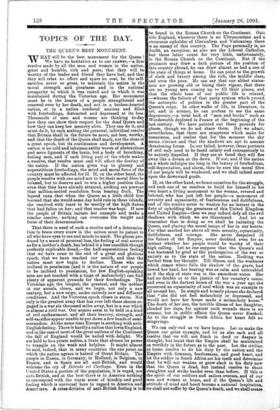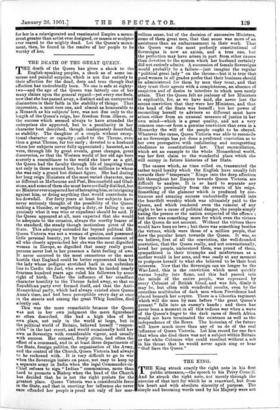TOPICS OF THE DAY.
THE QUEEN'S BEST MONUMENT.
WHAT will be the best monument for the Queen We have no hesitation as to our answer,—a firm resolve made by all the men and women in the nation, great and humble, rich and poor, that they will be worthy of the leader and friend they have lost, and that they will relax no effort and spare no cost, be the self- sacrifice never so great, to maintain the nation in the moral strength and greatness and in the national prosperity to which it was raised and in which it was maintained during the Victorian age. Her monument must be in the hearts of a people strengthened and renewed even by her death, and not in a broken-hearted nation, or in a nation rendered anxious and filled with forebodings, distracted and depressed at its loss. Thousands of men and women are thinking to-day how they can show their respect for the dead Queen and how they can keep her memory alive. They can do it, and must do it, by each making the personal, individual resolve that Britain shall in the future be more, not less, worthy, and that the death of the Queen shall mark, not the close of a great epoch, but its continuance and development. A nation is no cold and inhuman entity woven of abstractions and mere figments of the brain, but a body of breathing, feeling men, and if each living part of the whole makes a resolve, that resolve must and will affect the destiny of the nation. If the nation gives way to gloomy and superstitious forebodings, the mind and moral force of the country must be affected for ill. If, on the other hand, the people resolve with one mind not to let their moral fibre be relaxed, but to deserve and to win a higher position than even that they have already attained, nothing can prevent that million-souled resolution from bearing fruit. The legend runs that when the Queen as a little child first learned that she would some day hold rule in these islands, she resolved with tears to be worthy of the high duties that had fallen on her ; and that resolve was kept. If now the people of Britain imitate her example and make a similar resolve, nothing can overcome the weight and force of their determination.
That there is need of such a resolve and of a, determina- tion to brace every sinew in the nation must be patent to all who have eyes to see and minds to mark. The gloom pro- duced by a sense of personal loss, the feeling of real sorrow as for a mother's death, has behind it a less unselfish though perfectly explicable dread,—the half-superstitious feeling that we have come to the end of a great and glorious epoch, that we have reached our zenith, and that the nation must now begin to decline. Those who are inclined to pessimism (and it is the nature of our people to be inclined to pessimism, for few English-speaking men are not touched with a tinge of melancholy) can find plenty of apparent grounds for their forebodings. The Victorian age, the longest, the greatest, and the noblest in our annals, closes, and we begin, not only a new century, but a new reign, under entirely new and different conditions. And the Victorian epoch closes in storm. Not only is the greatest army that has ever left these shores en- gaged in a war six thousand miles away, but in a war which is almost a civil war. Our armies seem to be held in a kind of evil enchantment, and all their bravery, strength, and self-sacrifice appear unable to put down a few bands of semi- marauders. At the same time Europe is seething with anti- English feeling. There is hardly a nation that loves England, and in the case of most of the great nations of the Continent the fall of England would be hailed with delight. We are held to be a pirate nation, a State that abuses its power to trample on the weak and helpless. It might almost be said, indeed, that in many countries the one point on which the nation agrees is hatred of Great Britain. The people in Russia, in Germany, in Holland, in Belgium, in France, and in Spain are all anti-British, and would welcome the cry of Delenda est Carthago. Even in the United States a portion of the population, it is urged, are anti-British, and at the best there is in America nothing to correspond with the warm sense of kinship and good feeling which is universal here in regard to America and Americans. A cross-division of anti-British feeling is to be found in the Roman Church on the Continent. Oat- Side England, wherever there is an Ultrarnontane and a strenuous upholder of Clericalism and Vaticanism there is an enemy of this country. The Pope personally is, no doubt, an exception, as also are the Liberal Catholics, but these latter count for very little, unfortunately, in the Roman Church on the Continent. But if the pessimist may draw a dark picture of the position of this country abroad, he can draw almost as bad a one of the state of things at home. He can point to the growth of sloth and luxury among the rich, the middle class, and even the poor. He can say that our ablest states- men are growing old or losing their vigour, that there are no young men coming up to fill their places, and that the whole tone of our public life is relaxed, —witness the failure of that party system which proved the antiseptic of politics in the greater part of the Queen's reign. In other walks of life, in literature, in art, and in science, he can profess to see the same degeneracy,—a total lack of 'men and books" such as Wordsworth deplored in France at the beginning of the last century. We have pointed out these grounds for gloom, though we do not share them. But we admit, nevertheless, that there are symptoms which make for uneasiness, and realise that for the moment the sky seems o'ercast and that the shadows are apt to assume threatening forms. In our belief, however, these portents of evil only need to be faced calmly and courageously to be entirely dispelled. If they are so faced they will flee away like a dream at the dawn. If not, and if the nation as a whole indulges too long in the luxury of forebodings, self-depreciation, and alarm, then be sure the moral fibre of our people will be weakened, and we shall indeed enter upon the downward grade.
If, on the other hand, we brace ourselves for the struggle, and each one of us resolves to build for himself in his own heart a fitting monument to the woman, revered and beloved, who has just left her people—a monument of- serenity and equanimity, of fearlessness and dutifulness, and of the resolve never to weaken for an instant in the duty of upholding the greatness of this -United Kingdom and United Empire—then we may indeed defy all the evil shadows with which we are threatened. And let us remember that in doing so we shall be imitating the Queen, and placing the moral image of her in our hearts. For what marked her above all were serenity, equanimity, dutifulness, and courage. She never "despaired of he future of the Empire, never doubted even for an natant whether her people would be worthy of their high calling. Let no one suppose that the Queen's end was hastened by grief at the prolongation of the war or anxiety as to the state of the nation. Nothing was further from her thought. Till illness, and the weakness which comes where falls the shadow of the grave, had bowed her head, her bearing was as calm and untroubled as if the ship of state was in the smoothest water. She had no doubts as to the justice of her country's cause, and even in the darkest hours of the war a year ago she preserved an equanimity of soul which was an example to all around her. In simple and homely phrase she declared that "she did, not feel melancholy or depressed, and would not have her house made a melancholy house." The death of her son, the terrible illness of her daughter, clouded her days, for against such wounds there is no armour, but in public affairs the Queen never flinched. As to the struggle in South Africa her heart felt no misgivings.
We can only end as we have begun. Let, us make the Queen our great example, and let us also each and all resolve that we will not flinch in deed or despair in thought, but insist that the Empire shall be maintained as worthily in the future as in the past. Let the civilian at home resolve to do his duty by the nation and the Empire with firmness, fearlessness, and good heart, and et the soldier in South Africa set his teeth and determine that he will not weaken or grow slack in his duty now that the Queen is dead, but instead resolve to shoot straighter and strike harder even than before. If this is he spirit of our soldiers and sailors oversea, and of our men and women at home, and if the Queen's life and attitude of mind and heart become a national inspiration, we shall not suffer by the Queen's death, and we shall create for her in a reinvigorated and reanimated Empire a monu- ment greater than artist ever designed, or mason or sculptor ever reared to the mighty dead. Let the Queen's monu- ment, then, be found in the resolve of her people to be worthy of her.



















































 Previous page
Previous page